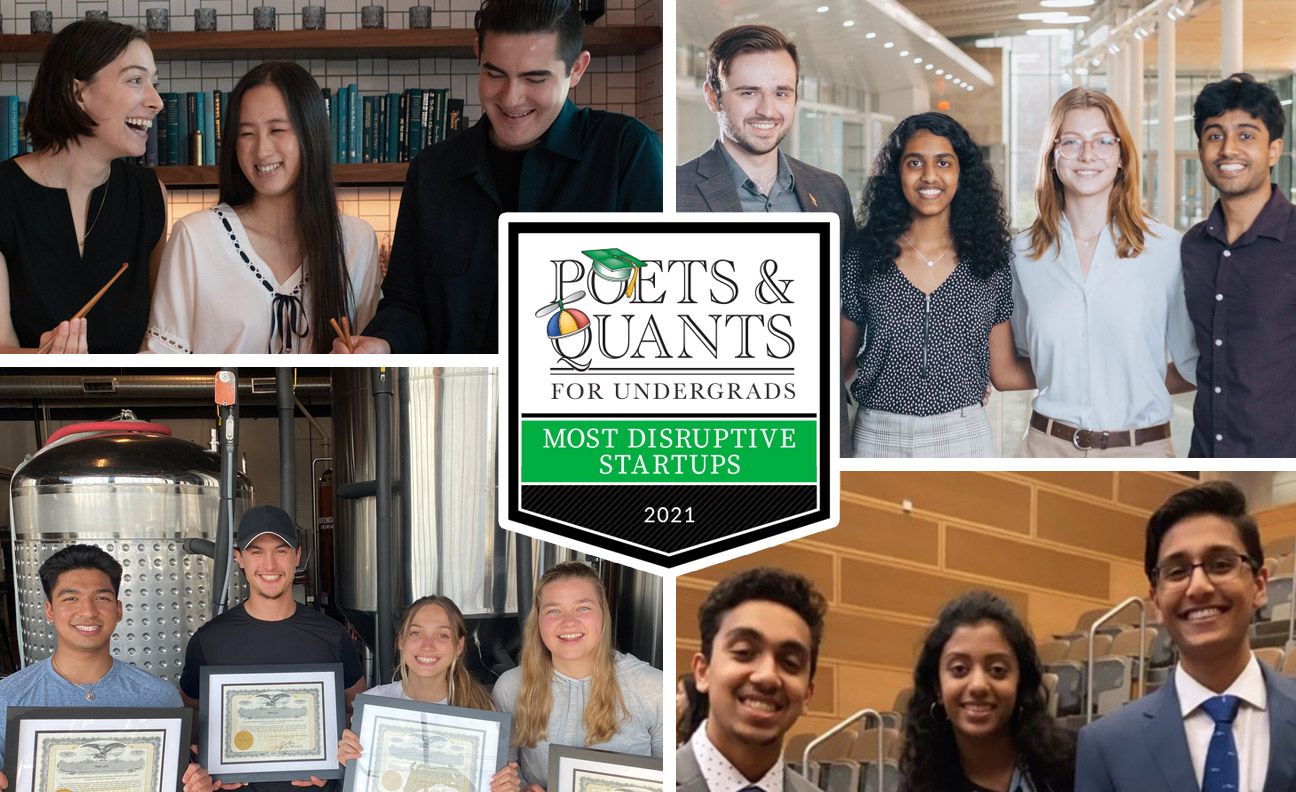
PUTTING YOURSELF IN ANOTHER’S SHOES…LITERALLY
The inspirations for these ventures were almost as varied as the needs they address. Before joining the the University of Virginia’s McIntire School, Marc-Anthony Larco grew up in Haiti — a place he returns to often. Inspired by his grandfather’s admonition to back up his words, Larco started Tech for Underprivileged Students, which is raising money to build computer labs in Haiti. The motivation behind Telo was equally personal, as co-founder Steven Bleau’s dad suffers from multiple sclerosis.
“[The National MS Society] ran a youth camp every year for children to learn about their parent’s condition,” Morgan Kerfeld writes. “One of the activities they did every year was an empathy exercise where they had the kids simulate common MS symptoms by having them wear things like weighted shoes, vaseline, covered glasses, and thick gloves while doing a series of tasks aided by a wide range of assistive devices. Not only did these exercises give Steven a better understanding of the challenges this community faced, but they also showed how assistive products can greatly improve a person’s quality of life but also lack a lot of innovation. This led Steven to study product design at the University of Minnesota.”
Other student entrepreneurs witnessed an opening…and capitalized. That was the case for Samay Bansal, Daniel Jones, and JJ Li. At Cornell University, they started 2 Stay 2 Go, a hospitality concept that began as a pop up restaurant last fall.
“We saw an opportunity to apply the skills to the real world acquired at the Cornell Nolan School of Hotel Administration,” Bansal notes. “There was a need for high-quality food in the Ithaca Collegetown market and a supply of students willing and able to produce high-quality food items. By applying our in-class learnings such as brand marketing, operations management, and culinary design — coupled with the supply of eager students looking to work in segmented departments — we created the perfect opportunity to launch 2 Stay 2 Go amidst a global pandemic.”
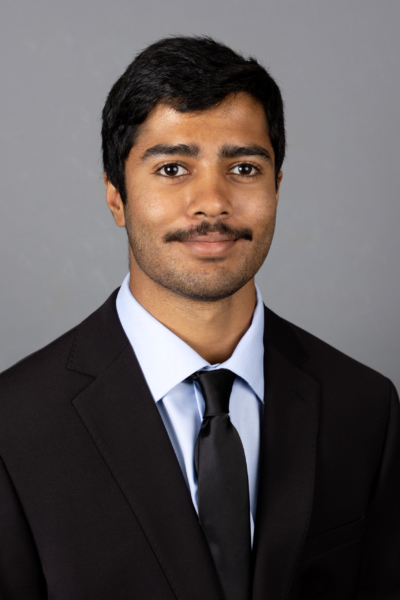
Ankush Bikkasani, Indiana University (Kelley)
THE DREAM: ACQUISITION
In other cases, disruptive startups were rooted in happy collisions. Rishi Nair, a NYU Stern junior, bonded with his co-founders over their shared desire to make finance more equitable and effective. More than that, they agreed that DeFi (Decentralized Finance) and Blockchain technologies were key to building this bridge. In response, they formed Sencha, which provides an application programming interface (API) for financial institutions to easily tap into the world of DeFi.
“We discussed our interests and learned that all of us had a distinct interest in the blockchain space and its incredible power to promote a more equitable financial system,” Nair recalls. “Everyone here at Sencha wants to build the financial system of the future—providing a DeFi bridge is the first step in our plans to augment and grow the financial industry.”
Ankush Bikkasani’s startup, Deep Word, was a response to his frustration with the status quo. For a decade, Bikkasanti has freelanced in video production. He describes it as an “incredibly repetitive process involving the same people talking about very similar things over and over again.” Along with that, it is a costly and time-intensive process, with Bikkasanti estimating that companies spend four hours creating every minute of video at a cost of $500-$1,000. That’s why he introduced a solution where companies can upload copy and choose video actors to deliver their message — in any language they choose.
Thus far, Bikkasanti has raised $175,000 in seed funding though competitions and investors. At the same time, his customer base has grown to 31,000 users in the past year, with clients currently generating 4,300 videos per week. So what’s Bikkasanti’s long-term vision? Think scale…and reward.
“Our goal is to seek acquisition after the next 3-5 years,” he tells P&Q.
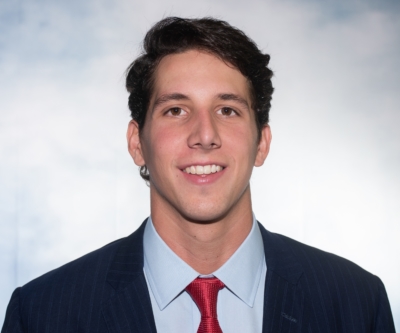
Thomas Issa, University of Notre Dame (Mendoza)
ALREADY CLOSING SALES
For some, the rewards are already rolling in. Telo made it to the semi-finals of the MN Coup, the largest state-wide startup competition in the competition. The United Nations invited Marc-Anthony Larco to join the Youth Forum in Geneva to speak about his philanthropy. Of course, there is the biggest reward of all: sales.
“Our biggest accomplishment has been securing over $30,000 in pre-orders on an extremely limited marketing budget,” explains Notre Dame Mendoza’s Thomas Issa, whose modular monitor mount is the centerpiece of his Rigg startup. “It was great to see consumers identify with and validate the problems we were trying to solve.”
As business majors, these startup founders learned how to operate in the black and identify prospects who fit their profile. For many, the differentiator has been the business school network that has been more than happy to come to their aid. Ankush Bikkasani, for one, is quick to credit the Indiana Kelley community for Deep Word’s success.
“Countless students and organizations I’ve come across have gone out of their way to leverage their skills and networks to help and guide our startup when we were first starting out, he writes. “Students and professors alike have introduced me to countless advisors, mentors, similar startups, and investors over the last 12 months alone.”
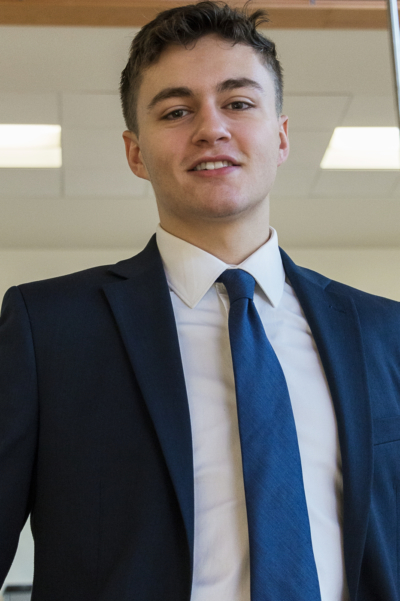
Jonathan Politzki, University of Illinois (Gies)
BE FAST, NOT PERFECT
In fact, many business courses encourage this dynamic. Exhibit A: The Hatchery — where Washington University students produce a market analysis, financial projections, operations plans, and an investor presentation for their prospective startup. This course, says Ayana Klein, enabled her to identify opportunities and gaps from entirely different vantage points.
“On the first day of class, every student has the opportunity to pitch a business idea, so I pitched 3Dux and proceeded to network with my class peers and built a group where we would put together a full-length, formal business plan and investor pitch throughout the semester,” she notes. “I thought this course was one of the most valuable business courses I have taken as I was able to experience 3DuxDesign from a new dimension. As a sibling-run company, my brother and I are often working inside our own bubble. Learning to work with other students and professionals and take constructive feedback from my peers, professors, and industry experts has been invaluable.”
Several business courses made an impression on this year’s disruptive founders. In Introduction To Entrepreneurship, Tepper students are given $60 and expected to turn a higher profit than their classmates. The course taught Nadia Susanto to “get into the weeds” and “think outside of the box and not just do the basic types of selling.” At the University of Illinois, Jonathan Politzki learned how to interpret the kind of data he receives to measure the functionality of his medical device. At the same time, Rishi Nair absorbed perhaps the most valuable entrepreneurship lesson from Professor Cynthia Franklin’s Getting to Launch: The Lean Startup.
This class highlighted the need to move fast and put your product out instead of focusing on perfection over the timing.”
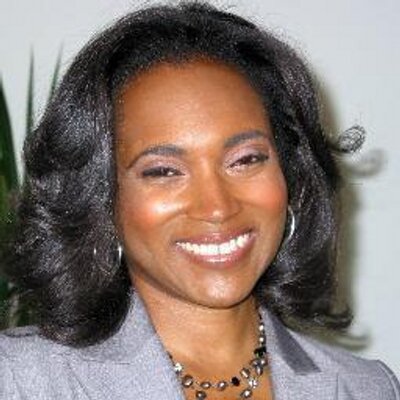
Cynthia Franklin, New York University (Stern)
THE REAL DIFFERENTIATOR: FACULTY
Franklin is among the unsung heroes of startup success: the professors who guide and support student entrepreneurs. To Nair, Franklin’s biggest contributions to NYU Stern founders cannot be measured in traditional metrics.
“She always believed in us as founders from the start and trusted our intellect. Allowing us to just be ourselves and not deal with the doubt that we face from the start of most conversations due to our age was incredibly helpful and helped us come into our own as founders.”
The same could be said for Professor Dave Roberts at Cornell University’s Nolan School. A former senior vice president at Marriott, Roberts can pull from three decades of leadership, finance, and analytics experience to make student ventures successful.
“He saw many restaurant concepts fail and succeed and used his experiences to help 2 Stay 2 Go operate effectively,” Samay Bansal explains. “He also helped us with finding the right products and pricing them correctly and contributed as a personal mentor. Professor Roberts explained how he believed it was possible to balance being a full-time student and starting a business. His tips for balancing recruiting for internships, studying for exams, being present at the storefront, and training employees were extremely valuable as a student-entrepreneur.”
Maybe the biggest compliment a professor can receive from a student-entrepreneur: We wouldn’t be where we are without him. That’s exactly how the founders of Telo feel about John Stavig, the director of the Holmes Center for Entrepreneurship at the Carlson School, who was a contributor as much as a cheerleader…even after graduation day.
“He has walked alongside our company since the beginning, constantly encouraging us to shoot for the moon while still being “business smart.” He has always taught us to not shy away from risks and that it is better to fail than to not have tried. As we have grown and all now graduated from the University of Minnesota, John has continued to support us by reviewing business plans and answering panicked emails, texts, and phone calls, while also making incredible connections for us in the start-up space. We cannot thank John enough for the role he has played in making Telo a reality.”
What are the most innovative solutions being built by current business majors and new grads? How did their schools help them grow their enterprises? What do they see in store for their ventures in the coming years? Click on the links below to learn more about this year’s most disruptive startups.
| Startup | Business School | Founders | Industry |
|---|---|---|---|
| Impact Food | University of California-Berkeley (Haas) | Kelly Pan, BS 22, (Haas); Adrian Miranda, Stephanie Claudino Daffara | Food |
| NoFores | Carnegie Mellon University (Tepper) | Nadia Susanto and Michael Lim | Golf/Virtual Reality |
| 2 Stay 2 Go | Cornell University (Nolan) | Samay Bansal, Daniel Jones, and JJ Li | Hospitality |
| Robotics For All | Georgetown University (McDonough) | Maximilian Goetz | Education |
| Nephra | University of Illinois (Gies) | Jonathan Politzki (Gies), Mary Cook, Amartya Dave, Maya Miriyala, Al Smith | Medical Device |
| Deep Word | Indiana University (Kelley) | Ankush Bikkasani | Artificial Intelligence/Sales & Marketing |
| Tour.video and LeaseMagnets | University of Michigan (Ross) | Amulya Parmar | Marketing Tech, Property Tech, Video, SaaS, B2B |
| Telo | University of Minnesota (Carlson) | Steven Bleau, Morgan Kerfeld, Rick Pradhan, Beth Urbanski | Health/Medical Devices |
| QUVI | University of North Carolina (Kenan-Flagler) | Harshul Makwana, Kush Jain, Alekhya Majety | Healthcare Technology |
| Rigg | Notre Dame (Mendoza) | Thomas Issa (University of Notre Dame), Josh Gilligan | Consumer Products |
| Sencha | New York University (Stern) | Rishi Nair (NYU) Christopher Lamarre, Kristian Lamarre | Decentralized Finance/Blockchain |
| El Maletín | University of Texas (McCombs) | Fabrizio Mata | Business Media |
| Technology for Underprivileged Students Foundation | University of Virginia (McIntire) | Marc-Anthony Larco | Nonprofit |
| 3DuxDesign | Washington University (Olin) | Ayana Klein, Ethan Klein | Education, Retail |











Questions about this article? Email us or leave a comment below.